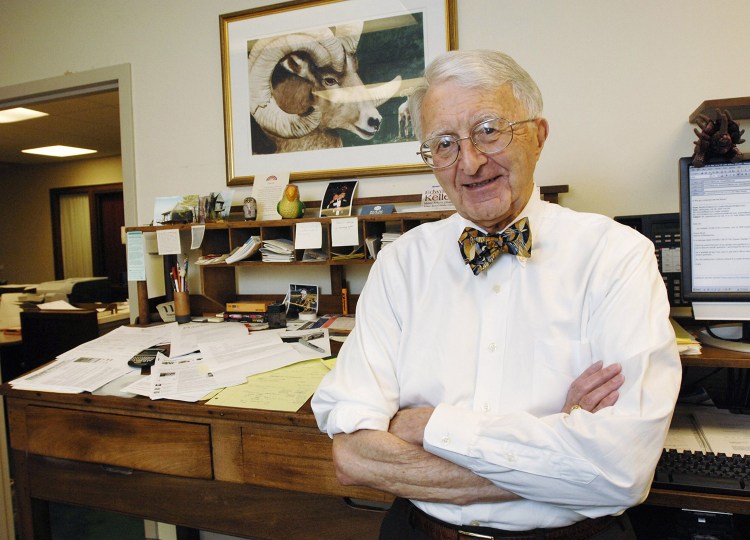In 1998, Ralph Lancaster was appointed special counsel to investigate President Bill Clinton’s labor secretary for alleged influence peddling and solicitation of illegal campaign contributions. He left his desk at the law firm Pierce Atwood in Portland and worked on the case for two years in Washington, D.C.
It was a high-profile case in the nation’s capital, but his colleague David Barry remembers how much his boss missed Maine.

Ralph Lancaster was named special counsel investigating President Clinton’s secretary of labor in 1998.
“We were getting close to finishing up our work there,” Barry said. “I remember he said to me, ‘I can’t wait to get back to Pierce Atwood.’ ”
Lancaster died Tuesday at the age of 88. He was remembered this week as a legal giant who had a reputation as one of the best trial attorneys in the country. For nearly six decades, Lancaster practiced civil and criminal law locally, nationally and internationally. The U.S. Supreme Court appointed him special master an unprecedented four times, meaning he made recommendations to the court in complex disputes between states, and Lancaster once represented the United States before the International Court of Justice at The Hague in a case that settled the Georges Bank boundary dispute with Canada.
“No Maine trial lawyer has ever risen to such heights in the pursuit of his calling,” said federal Judge William Kayatta, who worked with Lancaster at Pierce Atwood before being appointed to the First Circuit Court of Appeals.
But friends and colleagues also described Lancaster as a quiet man who did not want to draw attention to himself. The longtime attorney wrote his own obituary, which completely ignored the highlights of his long career. He asked people not to send flowers or make a monetary contribution in his memory, but instead take a loved one out to dinner and “enjoy the moment.”
“I wrote this obituary without a list of major professional accomplishments in order to emphasize that material matters pale into insignificance when compared to the love of family and friends,” Lancaster wrote.
Lancaster was born in Bangor in 1930. His father was an auto parts salesman, and his mother died when he was a toddler. When his father went to work in Portland, Lancaster was raised by a great-aunt and great-uncle. He graduated from John Bapst High School and attended the College of the Holy Cross and Harvard Law School. In 1954, he wed his high school sweetheart, Mary Lou Pooler. They spent two years at Fort Riley in Kansas as Lancaster served in the Army, and returned to Maine in 1957.
He became a clerk for the newly appointed U.S. District Judge Edward T. Gignoux. Lancaster considered the judge a mentor and would later hang a painting of him in his Portland office. The young lawyer joined the firm then known as Hutchinson Pierce in 1959.
Colleagues remembered his constant bowtie, his quiet wit and his tireless work ethic. For many years, he arrived at the office by 5 a.m. and was famous for sending emails at the crack of dawn. Lancaster only began to scale back his practice in recent years as his health declined, but he continued to send personal notes to his colleagues on their birthdays and hiring anniversaries.
His cases ranged from personal injury matters to felony charges to complex commercial disputes. He served as the president of the American College of Trial Lawyers and as chairman of an American Bar Association panel that reviews federal judges’ qualifications.
Despite his many commitments, Lancaster also took the time to mentor young attorneys like Kayatta, who joined the firm in 1980. He remembered working on trials with Lancaster as an associate.
“I can remember as a young lawyer, when you get into a new courtroom, you’re nervous about the judge or the jury,” Kayatta said. “I wasn’t worried about the judge in front of me or the jury. My mind was always worried about the guy sitting behind me.”
Barry, who joined the firm in 1988 and is now managing partner, remembered submitting drafts of briefs and letters to Lancaster for input.
“Even if you got it to him late at night, the next morning when you arrived at work, he would already be here, and the draft would be on your desk with extensive red markings on it,” he said.
Elected officials also turned to Lancaster for advice. In a written statement Thursday, Republican Sen. Susan Collins said she called on Lancaster often and will miss his friendship.
“Ralph advised me on issues ranging from the impeachment trial of President Clinton to nominations for the Cabinet and the federal judiciary,” she said. “His personal network was so broad that he always knew someone who knew the nominee and, in the case of Supreme Court nominations, Ralph often knew the nominee personally. As was his way, Ralph’s advice was always discreet, insightful, and completely trustworthy.”
As governor in the early 2000s, John Baldacci asked Lancaster to conduct an independent review of juvenile detention in Maine in the early 2000s. Lancaster noted inconsistencies in policies on the use of restraint and isolation, and Baldacci said those findings led to important reforms. Baldacci later went to work at Pierce Atwood.
“He gives Maine lawyers and Maine people and the state of Maine just a tremendous reputation,” Baldacci said. “You can be the best of the best anywhere in the world, and you can do it in the state of Maine, which he was very fond of reminding us.”
Lancaster is survived by his wife, six children, nine grandchildren and four great-grandchildren. Funeral arrangements are included in the family’s obituary on page B5.
Megan Gray can be contacted at 791-6327 or at:
mgray@pressherald.com
Twitter: mainemegan
Correction: This story was updated at 7:49 a.m. on Jan. 25, 2019 to correct the name of the trial lawyer’s association that Ralph Lancaster was president of.
Send questions/comments to the editors.


